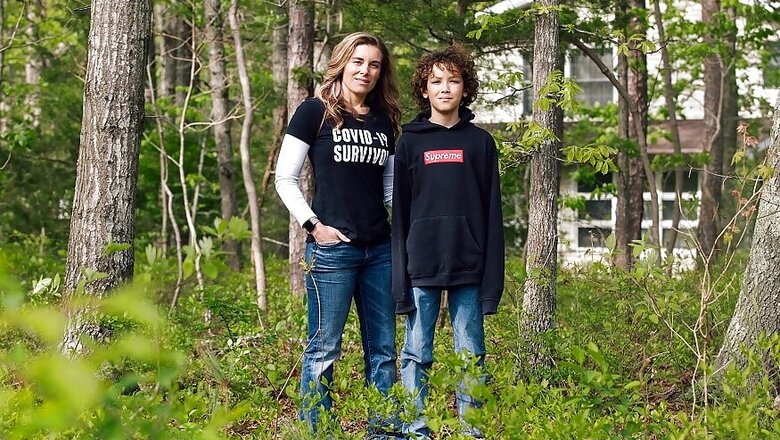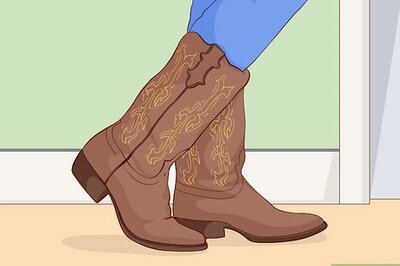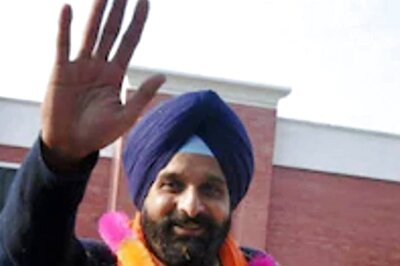
views
On the day Elizabeth Martucci and her 11-year-old son were deemed to have recovered from the coronavirus, they emerged from their home on the Jersey Shore with some sidewalk chalk to sketch a message in the driveway.
“We are COVID survivors,” they wrote. “I thought I’m going to tell everybody, ‘I had this, and I’m OK,’ just to show people it’s not a death sentence,” Martucci said.
She also bought T-shirts that said “COVID-19 Survivor,” anticipating that some of the neighbours on her cul-de-sac in Cape May Court House might have some lingering discomfort.
Martucci soon learned that she had drastically underestimated the anxiety she and her son, Marcus, would encounter. Even now, a month into their recovery, some neighbours see them and run.
As those who have been stricken with the virus emerge from hospitals or home quarantine, they are being forced to navigate a world that clearly is not yet ready to welcome them back into a still-sheltering society.
Federal health experts and epidemiologists agree that patients fully recovered from COVID-19 no longer pose risk of infection to others. Yet some people who have survived the illness are still confronting a fear-driven stigma from the outside world.
The veterinarian who refused to treat a recovered woman’s dog. The laundromat worker who jumped at seeing an elected official whose illness had been reported on the local news. The gardener who would not trim the hedges outside a recovered man’s home. The neighbour who dropped off soup and said not to bother returning the Tupperware it was in. And the sick teenager whose solace during his long illness was the thought of fishing with friends, only to have them ghost him when he recovered.
“My gut thought was not, ‘Oh, people will now be afraid of me because I had this virus,’” said Martucci, 41, who described a neighbour tripping over a curb while running for her door when she and her son, who goes by MJ, approached on their bicycles.
“It didn’t even occur to me — being shunned,” said Martucci, a real estate investor. “You’re looked at as a contagion, versus as a survivor.”
She said she had put the “COVID-19 Survivor” T-shirts away.
Feeling stigmatized is not what many survivors said they expected after their tough bouts of illness. It carries a particular sting given the worldwide discussions about how reopening society will hinge in part on people with antibodies being able to return to work, and about how those who have recovered can donate convalescent plasma for experimental treatments of those who are still sick.
“There is a dichotomy between feeling like you can go give your plasma to save other people’s lives but feeling like you’re an untouchable,” said Sheryl Kraft, a health journalist in Fairfield, Connecticut, who has written about surviving COVID-19 and how it affected her physical and mental health.
“We’re like the chosen ones,” she added. “We can go back into society, we can donate plasma, we are very valuable. But to people who are afraid of catching it, we are like pariahs.”
Mark Levine, a New York City Council member who leads the health committee, experienced virus symptoms in late March. He quarantined at home until he recovered from the illness, which was covered by the news media.
Weeks after he had recovered, Levine, who represents Upper Manhattan, said he was stunned when a worker at his local laundromat jumped at the sight of him.
“There are people who really think if you got it you essentially have magical armour and can never get sick again — that’s dangerous — but clearly, there are people who do not understand you’re no longer contagious if you’ve recovered,” he said. “It feels like we’ve failed on education on both sides of that.”
On Long Island, Flora Touloupis, 60, experienced both kindness and caution from a neighbour. After a brutal case of the virus that left her with bilateral pneumonia and blood clots in her legs, Touloupis said, she was warmed by the homemade chicken soup a neighbour in Lindenhurst dropped off after she had tested negative.
But when she texted about returning the soup container, Touloupis said, her neighbour told her to throw it away. So did her sister-in-law, who dropped off some lentils in a dish that she left on Touloupis’ porch.
“I said, ‘Oh my God, I feel like a leper!’” Touloupis said. “I am hoping that the people who normally eat at my house for Christmas will show up this year. It almost makes you feel ashamed.”
During the 21 days he was stuck isolating in his bedroom in Lakeland, Florida, William Long, 17, said the one thing that kept his spirits up was the idea of going fishing with his friends once he was better. “It was my No. 1 thought,” he said. “‘I can’t wait to get back and get healthy and hang out with all of my friends.’”
But even two weeks after he had recovered, he said his friends had not returned his text messages. The loneliness and feeling of being ostracized, William said, had prompted him to enroll in mental health counselling and to seek new friends.
“I was three weeks in isolation and then to see nobody?” he said. “It’s really heartbreaking.”
William and other survivors said they understood the anxiety. They know that there are instances of virus patients testing positive a second time and that the disease is so new there has not been enough time to study how long, or even if, any immunity lasts.
“People need to be afraid of this virus, because you do want to keep the numbers down,” Touloupis said. “But it’s still hurtful.”
Samantha Hoffenberg, who lives in Manhattan, said she understood why her family had stayed away from her for nearly two months after she had recovered: Her father died of the virus in April after contracting it at the hospital where he was admitted because of complications from dementia. She said the ordeal had been deeply traumatic.
After she became infected, she was committed to staying far away from her loved ones, even after she recovered.
Then on April 23, there was a fire in her building. After being hospitalized for smoke inhalation, she had a series of panic attacks. A social worker at the hospital called Hoffenberg’s family to tell them she was virus-free and wanted to see them.
They refused.
“I have never been in such a sad dark place after that happened,” Hoffenberg, a hiring recruiter, said. “And my own family is that scared of me that they are not even able to see through the fact that I am alone through this.”
Still, even as she craved a hug, she said, she had empathy for people who were scarred by the virus and as well as their loss. “They’re petrified,” she said.
Sarah Maslin Nir c.2020 The New York Times Company



















Comments
0 comment